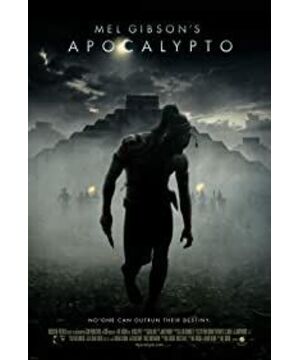Director: Mel Gibson Mel Gibson
Starring: Rudy Youngblood Rudy Youngblood
Gerardo Taracena
Dalia Hernandez
Genre: Action/Adventure/Drama
Duration: 139 minutes
Rating : R
Release: Disney
Violence is a theme of the film's aesthetics. Violence is at the heart and essence of every creative action, past and present, passively insidious or active, even in moments of denial.
- Michelle Moore (Defending Violence, Cahiers du Film)
"Apocalypto" (2006) is a powerfully violent visual that most people will be thankful for, Mel Gibson's revival The Passion of the Christ (2004) was wiped out in one fell swoop, but it seems to me that it belongs only to the director's own paranoia, and his film seems to be tied to several key words "Ireland", "Catholic".
"Revelation", about inter-ethnic revenge
Looking back at European history, the Middle Ages were shrouded in signs of private revenge. The obligation of revenge was first and foremost undertaken by the injured person; revenge was the most sacred duty he had to perform, even extending to Duties after death. So Germanic religious jurists defined inter-ethnic revenge as follows: "We call revenge by relatives as inter-ethnic revenge." It can be said that later European dramas were influenced by inter-ethnic revenge, and the subject matter is too numerous to enumerate. .
Regarding the uncertainties in Europe, the issue of Scotland or Northern Ireland once became a popular movie performance. Naturally, British public opinion has always questioned and criticized such themes. Mel Gibson's Irish ancestry has always had a few complexities - the Middle Ages and the return of Northern Ireland. In this way, it is easier to deconstruct "Revelation", and then connect to "Braveheart" (Braveheart, 1995), the story of Scotland and Ireland's revenge against England on the medieval stage is presented, plus the filling of tragic love, the freedom of spirit. Gimmicks, detailed descriptions of violent wars, and the squeezing and release of excited male emotions are also reasonable things to do in the same way as "Revelation".
"Revelation" just moved such a simple and straightforward story to the American continent, and Mel Gibson gave the power of religious mysticism, so a bloody movie was presented in front of us.
The protagonist of the movie, Tiger Claw, started this stupid revenge after the entire tribe was purged and slaughtered. It is not easy to categorize him into a specific group. It seems that the entire Indian Gulf group is only the Tiger clan of the Creek tribe. But found a mistake, the director obviously only used the carrier of Mayan culture to map a modern story, and greatly weakened the specific cultural background and national characteristics. If we delve into the historical basis of the film or the authenticity of the film, it is meaningless.
Throat, Circumcision and Religious Mysticism
Mel Gibson has a soft spot for two flamboyant ways of dying. In "Braveheart", Molang died of throat slitting, and Wallace died of caesarean section; in "Revelation", Tiger Claw's father died of throat slitting, and other tribesmen died by caesarean section.
Throat cutting is closely related to ancient Roman times, and this method of suffocation seems to be regarded by Catholics as a benevolent reward; caesarean section is one of the most tortures of pagans by Catholics. Throat cutting and belly opening are always associated with the conquest of the strong. Starting from a narrow mind, Mel Gibson endowed them with long-lasting reverie in the religious sense.
The development of the Indian tribes differed from that of Europe at that time by two civilization stages, with the Iroquois, Crick, Ottawa, Aztec and other tribal alliances as the highest form. As a result, this relatively primitive social alliance was formed 150- It was completely destroyed by European colonists in 200 years. It is true that the Indians did not have the habit of exchanging and releasing prisoners. Except for adoption, the rest were either burnt or sacrificed to the gods. As for slaves, there were also a few. We have seen from the scenes of the movie one by one, the director is trying to create an inevitable result - only the combination of European civilization and Christianity can eradicate the ignorant barbarism of the American continent.
It is precisely at the end of the film that what we see is the huge fleet of European colonists, and then the civilized man carrying the cross is floating, and what we feel behind is Mel Gibson's weird grin. This kind of engulfment by European civilization and Christianity is even more logical.
Violence, the eternal theme
The development of human civilization is always accompanied by brutal violence. It is reasonable for movies to confront violence, and reality is often more cruel than movies, but we have not condemned anything. What reason do we have to object to the warnings brought by the movie's bloody visual impact?
Mel Gibson's violent aesthetics are only paranoid and limited, based on pure physical injury and simple psychology. This is limited to the realm of piercing the heart and amputating limbs. I no longer expect him to have any more creative ideas. .
Going back to the original theme, Mel Gibson - Catholic of Irish descent, it's what he showed that limited his development as a director.
Recent information from various sources has given us the impression that Mel Gibson is a rude Irishman and a hysterical Catholic. It's no longer news to drag cars or beat up someone, and it's the "anti-Semitic" argument that he repeatedly utters nonsense that deserves vigilance.
At the same time, director Mel Gibson is also strongly dissatisfied with the Iraqi issue in the United States, so the deep theme of "Revelation" emerges - the aggression and vendetta between small ethnic groups will be swallowed up by other civilizations, then the human society will be devoured. Development, will this cruel reincarnation shroud us? (Text/Changyou Four Hospitals)
View more about Apocalypto reviews









